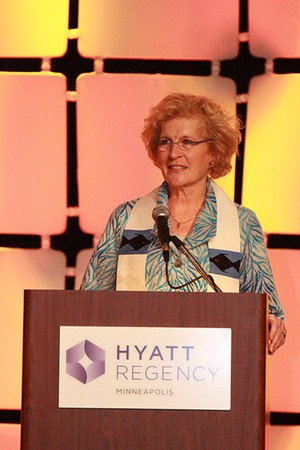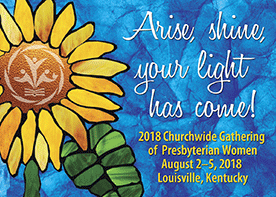
As she offered greetings to Gathering attendees, Linda Valentine said she feels incredibly blessed to have been able to serve the denomination for the last nine years. Photo by Michael Martin.
An Interview with Linda Valentine
By Yvonne Hileman
Linda Valentine, executive director of the Presbyterian Mission Agency, announced on June 16, 2015 that she is resigning her position effective July 10. I had the chance to speak with her on Wednesday, just a day after the announcement, before she arrived at the 2015 Churchwide Gathering of Presbyterian Women.
Of what are you most proud during your term as executive director?
We have really reshaped our understanding and orientation of the Presbyterian Mission Agency to adapt to the times we are in. This is an ongoing process. We are in a time of change and continue to develop our understanding of our role in a complex church and world. We work to inspire, equip and connect. People continue to be called into mission service, to respond and serve in amazing places. Our mission coworkers see their role as connecting folks to the Presbyterian church in a helpful, not hurtful, way. There is an emphasis on young adult and collegiate ministry. Our goal is to increase the number of Young Adult Volunteers. Thirty percent eventually go to seminary. In this way, we are renewing the leadership of church. Presbyterian Disaster Assistance has grown in its ability to respond to needs, and work more closely with mid-councils. When we reshaped the Office of Public Witness, we maintained the role to speak to corridors of power, but also turned it around to how do we equip Presbyterians for advocacy? Our movement to start new worshiping communities continues to grow, to bring promise and vitality to the church. Half are racial ethnic, a quarter are young adult, 40 percent were de-churched, unchurched, or non-Christian. Several years ago we started noticing new worshiping communities in Atlanta, Philadelphia and Los Angeles, and we said, “God is at work in these communities.” We started noticing where God is already at work, and asked how can we foster that, how can we fuel the movement, inspiring others to join? We have 280 new worshiping communities now.
What are some of the most important and/or memorable things you have learned from church members whom you have met during your tenure?
This is a very special vantage point. From here, I have seen the depth and breadth of mission involvement, from local to regional to international. It has been immensely rewarding to meet people who have been involved for years and years. They have developed relationships in a time of one-off mission. There is a deepening cultural understanding in our mission work, and a growing mutuality. It’s inspiring to see so many dedicated to that. And to advocacy. There’s such commitment to the issues of immigration and gun violence, for example. Presbyterians are thoughtful and deliberate. It is a great inspiration to meet people who really understand issues and get deeply involved.
What has surprised you?
Again, I was very active in a large congregation in Chicago. I was a committee chair, involved in a lot of things. Even from that place, I only had a limited view of the scope and depth of the mission that the church is involved in. In my visits abroad, for example, going to Lebanon, South Sudan, I realized how much the church has been instrumental in helping churches take root, how important our relationships are in these other countries, in what high regard they hold the PC(USA). Mission coworkers often say, “If Presbyterians could only see how respected they are in other parts of the world, where our missions are . . . .”
Where do you see the growing edge of the church?
New worshiping communities, particularly. Vera White calls them the research and development lab of the church; existing and new worshiping communities together teach us much about being church. Young adults: when I see how many we have working here and in other parts of the church, I have hope. Pew Research shows a decline in religious affiliation, but there are a lot of committed and engaged young people in our church. The other is to become much more racially and ethnically diverse. That has been our goal for years. We are seeing some of that, but we need to see a whole lot more. The issues of racism and privilege are still serious issues for the church and the country. That has to be something that the church addresses. We must be involved in issues of racial reconciliation and inclusion, and cultural humility. [Editor’s note: This conversation was held eight hours before the shootings at an AME church in South Carolina.]
How does a connectional church make the case for national ministry in an era of decentralization?
Some of the examples I’ve given. Presbyterian Disaster Assistance, for example. As a denomination, we can respond in a way that a congregation or presbytery cannot do. With expertise and funding from One Great Hour of Sharing, volunteers collectively can respond to disasters. Advocacy, too. When we put out a call when the issue of whether to bomb Syria came up over a year ago, within days several thousand responded. To be able to equip and mobilize that sort of effort is valuable. Lastly, I’ll use World Mission as an example. Sure, congregations can send mission trips to other countries and do, but mission is more transformative and effective when it is coordinated nationally. Our mission networks exchange information, and thus we can be more effective. Nationally sent mission workers know the people, the cultures, and can make mission trips more responsive and effective.
Has the exodus over social justice issues/last summers’ GA votes slowed?
When we talk to presbyteries, there are still congregations in the process of departure. Our prayer is that we have seen most of that happen. The presbyteries will move forward with the ones they have. Will any return? I would hope so. Jesus’ prayer is that we would all be one. We always pray for reconciliation, one holy, catholic, and apostolic church.
What is the future for 1001 Worshiping Communities?
The church remains committed to 1001 Worshiping Communities. Under Vera White’s leadership, the ministry continues to grow. It is vital and important and has brought new people into the Presbyterian community. We expect that it will continue to provide vitality for the church.
How has your understanding of PW changed during your tenure?
As Nicholas Kristof has said, women hold up half the sky, but I say they hold up more than half the church. PW has been faithful and engaged for 200 years, and continues to be so. I love the commitment to Bible study and spiritual growth as well as to mission. Let me just lift up Yodogawa as an example of the impact of Presbyterian Women. A few years ago, they returned the gift they had received from Presbyterian Women in 1955. With the original gift, they built a hospital that is now a major medical center where Christians witness to the love of God. The seed was planted and has borne fruit. PW continues to do that.
How can Presbyterian Women best strengthen the PC(USA)?
In the ways that you are doing it. I was interested to see in the latest Quarterly Newsletter where you highlighted your partnership with Presbyterian Disaster Assistance, promoted Young Adult Volunteers and Presbyterian Peacemakers, lifted up the work of our reconciliation catalyst Shannon Beck and our poverty catalyst Frank Dimmock, all those ministries of the church that PW participates in.
About her decision to step down after nine years as executive director of the Presbyterian Mission Agency, Linda said, “I have had a strong sense of call to this ministry since I first became executive director in 2006, but lately I have been reflecting on where God is calling me now. . . . Even though this has been a difficult time for the agency, staff and board, our commitment to our mission and ministry has been unwavering. It’s time for the organization to move forward. Work is beginning on a new Mission Work Plan through 2020. So the timing is right for new leadership to shape and lead the agency in good and faithful directions.” She told Churchwide Gathering attendees that she feels incredibly blessed to have been able to serve, and is very grateful for the opportunity and for her many friends and colleagues in ministry.

